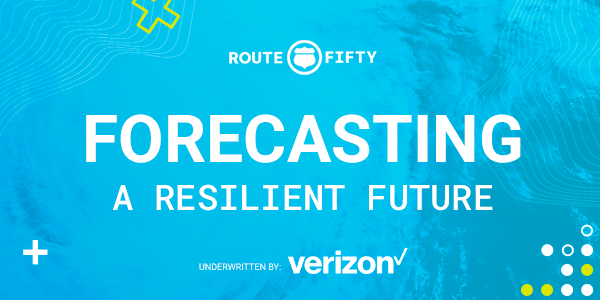
Forecasting a Resilient Future
The webinar, moderated by Alisha Powell Gillis, organized by Route Fifty and underwritten by Verizon had speakers discuss the ways state and local governments are adapting their approach to resiliency in the light of issues like climate change, manmade threats like domestic terrorism and the ongoing pandemic. The discussion touched upon topics like resilience, community and government strengthening, investments in resiliency, collaborations and core competencies needed to be possessed by future emergency managers.
Key Takeaways
On Resilience:
- Resilience is a two way street. Many times governments are relying on communities to be resilient. If communities do not have a strong governance structure, they tend to be less resilient.
- Underserved communities are underserved by governments. When governments are not familiar or if state and local staff are not comfortable with dealing with diverse communities, intentionally or unintentionally they make the underserved communities less resilient.
- There have been several tornadoes in the last few years in Oklahoma
- The goal has always been to provide for health,safety, and welfare not only for those who live but also for those who visit
- When there is an emergency, our goal is to return to normalcy as early as possible. The city leadership is strong and local and hence understands the situations and sentiments quickly.
On Government/Community strength:
- Not all communities are equally resilient. Less inclusive policies cause communities to be less resilient.
- Communities of color/ disadvantaged take longer to recover from disasters
- When we say that we want to reinvest and find opportunities to invest funding in underserved communities, we must understand that the intention is to not just taking them to where they were, but to better them.
- Cultural competency training among government employees is important, to ensure communities are included and are not unheard
- It is important to make sure planning is equitable, policies are suitable and funding is equitable as well and it is important to act on it and move beyond mere lip service.
On beneficial impactful investments in resiliency:
- It is important to invest in Community assessment to understand how communities work with one another
- Identify, communicate and collaborate with community leaders and find out who the influencers are, and what are the best methods to communicate
- It is vital that investments are made in implementation of equitable planning and in response and recovery methods, specifically to tribals, to address the concern of intentional exclusion
- Infrastructural investments need to be focussed on and equally on the preparedness of work
On collaborations and competencies of future emergency managers:
- A larger part of resilience is inclusion. It cannot be “about us without us”
- Everyone has a role in resilience - government and citizens
- Mindset of emergency manager is to be prepared and prepare officials
- Diversity of disasters is always present
- People, private entities, government and community relations need to always be in place
- It is important to enable emergency managers utilize policies in alignment with community needs
- The future emergency managers need to be able to build relationships, manage recovery and significantly large budgets, be accustomed to diversity and be compassionate to connect with diverse communities and have a working knowledge of everything relevant.
